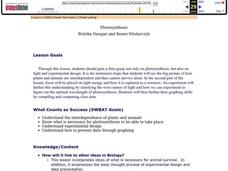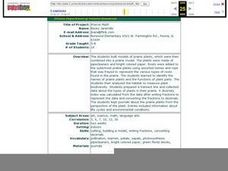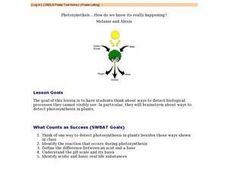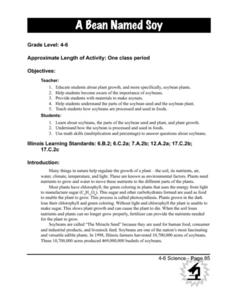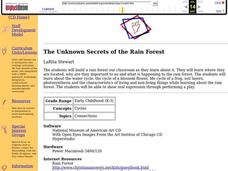Curated OER
Photosynthesis
Students recognize the importance of plants as they perform an experiment involving photosynthesis. Students determine the optimum wavelength of light for photosynthesis by exposing plants to different colors of light, collecting data,...
Teach Engineering
Photosynthesis—Life's Primary Energy Source
Wouldn't it be great if you could produce your own food? Scholars learn about the processes of photosynthesis and cellular respiration in plants. They consider how to use photosynthesis as a model of an efficient system and how to apply...
Curated OER
Photosynthesis
Students conduct experiments with plants. In this photosynthesis lesson, students examine plants under different types of lights. They calculate the amount of dissolved ocygen concentration and compare it to the formula for...
Curated OER
TE Activity: Bubbling Plants
Students study a way to quantify the process of photosynthesis during a given time using the Elodea plant. They design a hypothesis that they test in the hands on activity. They compare the amounts of photosynthesis that occur during low...
Baylor College
Plant Parts You Eat
Plants provide a variety of delicious foods essential for human survival. In the fourth lesson of this series on food science, young scientists investigate common fruits, vegetables, and grains in order to determine which plant part is...
Curated OER
Prairie Math
Learners work together to build models of prairie plants. Using the model, they estimate the height and then measure them using metric and standard units. They write a fraction to represent their part of the whole set and compare and...
Curated OER
Photosynethsis....How do we know it's really happening? - Biology Teaching Thesis
Students think of one way to detect photosynthesis in plants besides those ways shown in class. They identify the reaction that occurs during photosynthesis. Students define the difference between an acid and a base. They identify acidic...
Curated OER
Benefits of Indoor Plants
Young scholars diagram a plant. In this Science instructional activity, students explore the concept of photosynthesis focusing on the oxygen production. Young scholars calculate the amount of plants needed to filter the air in their...
Curated OER
How Plants Help Us Breathe
Third graders discuss how humans breathe and how plants help us to stay alive. In groups, they identify and label the different parts of plants and describe their functions. They compare and contrast the ways plants and animals breathe...
Curated OER
Fiber of Life
Young scholars examine the importance of plants to individuals and society through a multi-discipline set of activities. They observe and draw different leaf structures and then create a book about trees and photosynthesis. They explore...
Curated OER
Leaf Straw
Learners investigate plant structure and the process of photosynthesis. Using everyday items, they demonstrate that the leaves and stems of plants can act like a straw. In addition, they identify plant structure.
Curated OER
Do Plants Eat?
Students explain that photosynthesis is a process that plants use to convert light energy into glucose. They summarize photosynthesis as a chemical process in which the plant uses carbon dioxide and water to form glucose and oxygen.
Curated OER
Mighty Oaks from Little Acorns
What does it mean to grow? To germinate? For the plan detailed here, class members investigate the growth process of an oak tree while focusing on the beginning stages of planting and germination. They plant seeds and record observations...
Curated OER
Biology: Plants - The Fiber of Life
Young scholars, in groups, examine and list the varieties of plants and how they relate to man and the environment. They create plant books complete with leaf samples with sketches and information, grow beans in plastic baggies, and...
Curated OER
What is Air?
Students investigate air by participating in a class experiment. In this matter measurement lesson, students identify air as a gas which consists of mass. Students utilize a windsock or balloon to measure oxygen and explore it's true...
Curated OER
Does Clear Water mean Healthy Water?
Learners test their local aquatic site to determine its water clarity. They collect a water sample and measure its turbidity using a sensor, then they repeat the experiment to obtain a second turbidity reading to find the average value.
Curated OER
How Does Your Plant Grow?
Students measure and record their height in centimeters on a graph. By integrating math and science, students collect data and apply graphing skills to the experiences they are having growing plants. Finally, students identify how to...
Curated OER
Prairie In A Bottle
Second graders observe images of prairie ecosystems and discuss the needs of living things. They create a prairie habitat in a closed jar to observe the water cycle and plant growth.
Curated OER
Soybeans: The Miracle Seed
Students discover why soybeans are called the "miracle seeds." They make their own soynuts and share other foods made from soybeans. They create a bulletin board of soybean products.
Curated OER
How do living and non-living structures affect coral reef habitats?
Learners create model coral reefs showing surface area and including examples of communities. In this coral reef lesson, students research and explore the functions or benefits from a coral reef. Learners design a benthic habitat....
Curated OER
Prairie Food Chains & Webs
Students complete a food chain. In this ecosystem lesson, students learn about producers, consumers and decomposers. Students identify herbivores, carnivores and omnivores and complete two worksheets.
Curated OER
Polar Bear Panic!
Students identify the three realms of the Arctic Ocean, and describe the relationships between these realms. They graphically analyze data on sea ice cover in the Arctic Ocean, and recognize a trend in these data.
Curated OER
Investigating and Using Biomass Gases
Learners examine the definitions of biomas gasification and generate their own biomass gas. In this renewable energy lesson students collect gases and roast a marshmallow.
Curated OER
The Unknown Secrets of the Rain Forest
Students listen to the story "The Great Kapok" then discuss characteristics of the rain forest. They make several different types of rain forest animals from paper plates (ex. sloth, tigers, monkeys etc) and design costumes for a...


